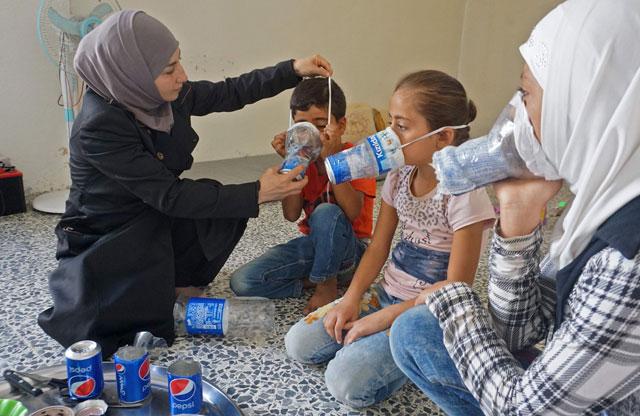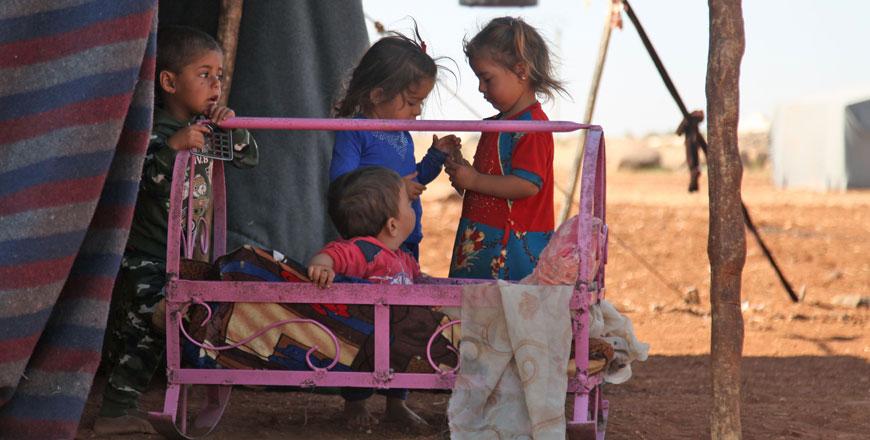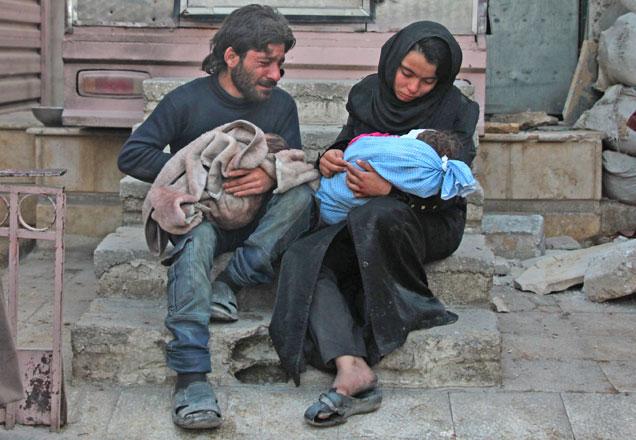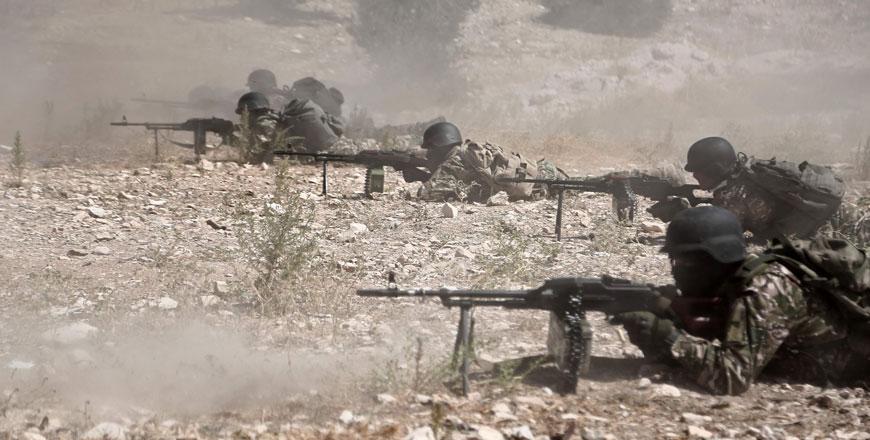You are here
Turkey works with Russia on Idlib amid lull in air strikes
By Reuters - Sep 14,2018 - Last updated at Sep 14,2018

Um Majid (left) tries an improvised gas mask on family members in her home in Binnish in Syria’s rebel-held northern Idlib province as part of preparations for any upcoming raids on Wednesday (AFP photo)
ISTANBUL/BEIRUT — Turkey has said it is working with Russia and Iran to stabilise Syria’s rebel-held Idlib region, indicating continued efforts to avoid a Syrian government offensive in the area, where Ankara failed to secure a ceasefire last week.
Damascus, backed by Russia and Iran, has been preparing a major assault to recover the region. The United Nations has warned this could trigger a humanitarian catastrophe in an area where 3 million people live.
Idlib is part of an arc of territory at the Turkish border representing the last major area held by insurgents who have fought President Bashar Assad through more than seven years of war. Assad has vowed to recover “every inch” of Syria.
Turkey, which backs the anti-Assad opposition, has been warning Assad and his allies against attacking Idlib. It has reinforced 12 military observation posts in the region, and stepped up arms shipments to allied rebels.
But Turkish Defence Minister Hulusi Akar, in comments on Wednesday evening, indicated that there were continued contacts with Russia and Iran for a diplomatic solution.
“We are working intensively with Russia, Iran and our allies for peace and stability to be brought to the region and for a humanitarian tragedy to be prevented,” he was quoted as saying on Thursday by the state-run news agency Anadolu.
Turkish President Recep Tayyip Erdogan met with the leaders of Iran and Russia last week in Tehran, but failed to win a ceasefire pledge.
Already hosting 3.5 million Syrians, Turkey says it cannot take in more and has accused the West of abandoning it to the consequences of Assad’s reconquest of Syria.
Russian and Syrian warplanes launched waves of air strikes in the northwest last week, killing dozens and uprooting tens of thousands. But activists said there had been a lull.
“For the past three days things have been calm,” said Abdel Razzaq, a monitor for the Sentry warning service, which operates in opposition-held parts of Syria.
Speaking from where he monitors the skies in Maarat Al Numan, south of Idlib city, he said there had been no air strikes, although some shelling continued on the frontlines.
Syrian Observatory for Human Rights director Rami Abdulrahman said neither Russian nor Syria warplanes had been attacking the area since around midday Monday.
Speaking in China, French Foreign Minister Jean-Yves Le Drian said the international community must mobilise to come up with a humanitarian plan to guarantee access to Idlib.
“The reality is ... that Bashar Al Assad only wants a military victory and has started the offensive to retake the Idlib region with the support of Russia,” he said.
The United Nations said it was preparing to give help to 900,000 people who could flee a surge in hostilities.
Panos Moumtzis, UN regional humanitarian coordinator for the Syria crisis, also quoted a Russian official as telling a humanitarian task force in Geneva that “every effort to find a peaceful solution to the problem is being made at the moment”.
The opposition accuses Russia and its allies of attacking hospitals and civil defence centres to force rebels to surrender in a repeat of earlier, large-scale military offensives in areas such as Aleppo and Eastern Ghouta.
Moumtzis said the UN had shared the GPS coordinates of 235 protected sites in Idlib, including schools and hospitals, with Russia, Turkey and the United States in the hope they would not be targeted.
Related Articles
BEIRUT — The Syrian military shelled the last stronghold of active rebellion against President Bashar Assad on Wednesday as a war monitor sa
ANKARA — Turkey called on Russia and Iran on Wednesday to pressure Syrian authorities to halt a military offensive in Syria's rebel-held Idl
ANKARA — The US envoy for Syria was in Ankara on Tuesday to discuss the latest developments in the war-torn country with Turkish officials a


















